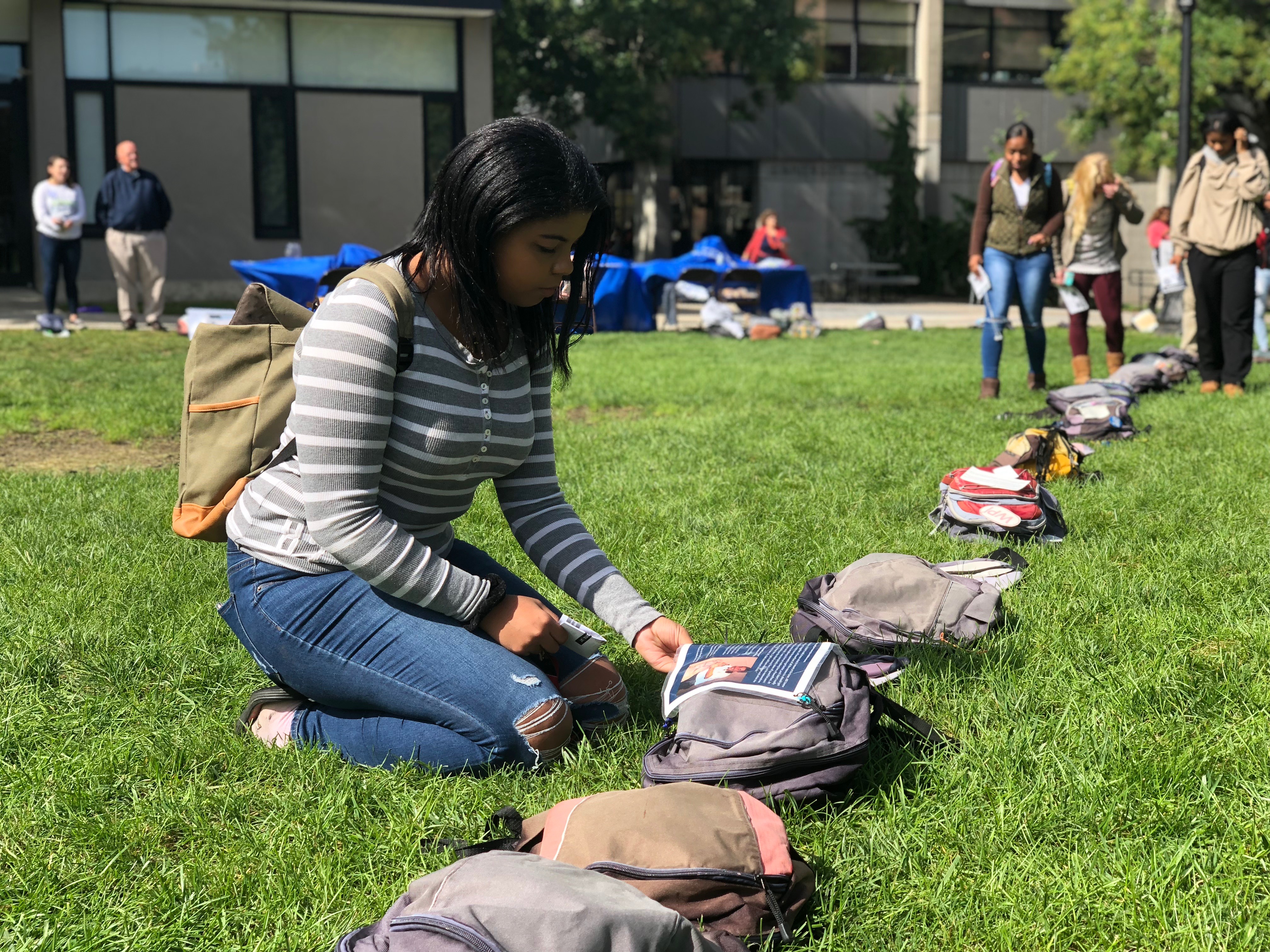
Laura Sarria
Assistant Sports Editor
Over 1,000 backpacks were aligned on the grass on Shawnee Quad to represent the lives lost from suicide each year. The Send Silence Packing, a nationwide traveling exhibit, came to ESU — hosted by Active Minds on Monday, Sept. 25.
The backpacks were donated to National Active Minds by the families of those who lost a loved one from suicide with personal stories attached to them where students at ESU were able to read.
“My sweet son, Larry Weinberg, ended his life on the morning of his 18th birthday. It was Tuesday, February 8, 2000.” said one of the statements on a backpack.
The backpacks were aligned in a pattern to attract students and allow them to get a whole view of how many lives have been lost by suicide.
“This [exhibit] brings attention in a more physical way rather than seeing an Instagram post” said freshman Kahlila Williams. “As someone who struggled with self-harm and suicidal thoughts, I want people to know that life gets better because it [suicide] is a permanent solution to a temporary issue”
Active Minds strive to change the conversation about mental health, create awareness and decrease the stigma.
“When talking about suicide, you never want to say, ‘a person committed suicide,’ because the word, ‘committed’ is stigmatizing” said Melissa Schneider, one of the Co-Presidents of Active Minds on campus. “You want to say, ‘died by suicide’ or ‘lost to suicide.’”
Active Minds encourage people to seek help whether it is for themselves, their friends, or family. If someone reaches out to either their friend, family or an active mind member, the first thing to do is connect that individual to resources as soon as possible.
“Suicide affects everyone,” said Raquel Sosa, the President of Active Minds. “We want to make sure everyone knows that it is okay to ask for help.”
ESU’s Department of Counseling and Psychological Services (CAPS) is located on the second floor of the Flagler-Metzgar Center.
“Once I got involved in Active Minds, I realized how our changes were impacting the campus and how the club went from being unknown to being the club of the year last year,” said Schneider.
National Active Minds was founded by Alison Malmon when she was 21 years old — 15 years ago — when her only brother died by suicide in 2000.
She wanted to help all of those who suffer in silence and make them know they are not alone.
Malmon created a platform at her university that quickly began to grow, people got involved, individuals across the country began to call until the platform was renamed to Active Minds.
The program got established as a non-profit organization in 2003. Their movement is to end the silence and get people talking.
“The exhibit really shows all those voices that were never heard,” said junior Shane McGrath. “We don’t know what the other person is battling with so we should really be kind to one another.”
The Send Silence Packing, the program included in the Active Minds organization, is an award-winning exhibit, since 2008, that travels around the nation to physically demonstrate the amount of college students that are lost by suicide each year. Families of the victims donated their loved ones’ backpacks to help spread awareness — aiming to end the silence that surrounds mental illness and inspire action for suicide prevention.
“My brother attempted to take his life my freshman year at ESU,” said Sosa. “I want people to know that suicide is preventable. I want people to not feel ashamed, to reach out and get help.”
Active Minds had a table with a variety of resources available for students to take on Shawnee Quad while participating in the exhibit. The resources ranged from “How to Help a Friend” pocket guides to “8 Ways to Manage Stress” guidelines along with signs of stress, anxiety, or depression.
“I know a lot of people that struggle with mental health and are ashamed of it.” said Schneider. “I knew that the stigma was taking a control of the people I loved. I wanted to learn what small things I can do that can lead to big things and change the conversation about mental health.”
If you or someone you know is struggling and needs help, please get assistant by going or calling ESU’s counseling center (570) 422-3277. For 24/7 Suicide Prevention Lifeline call (1-800-273-TALK). For more information, please visit www.activeminds.org.
Help to change the conversation; do not wait until it is too late. Always remember, “it’s okay to not be okay.”
Email Laura at:
lsarria@live.esu.edu

